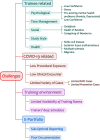Implementation and evaluation of a mentorship program in clinical master in family medicine during the COVID-19 pandemic at the Arabian Gulf University: a longitudinal study
- PMID: 38997679
- PMCID: PMC11241932
- DOI: 10.1186/s12909-024-05677-8
Implementation and evaluation of a mentorship program in clinical master in family medicine during the COVID-19 pandemic at the Arabian Gulf University: a longitudinal study
Abstract
Background: We implemented a contextualized innovative mentorship program in the Clinical Master in Family Medicine (CMFM) program established in April 2020 at Arabian Gulf University. In this paper, we describe the process of this program and derive the major challenges faced by trainees and related corrective actions and their outcomes on high-risk trainees for optimal performance.
Methods: We conducted a mixed-method longitudinal study of 80 trainees, analyzing information extracted from the Moodle learning platform about five key performance indicators as well as the contents (quantitative and qualitative) of mentoring meeting reports submitted through a validated online form between 2020 and 2022. We analyzed frequencies and themes of challenges and compared trainees' performance according to time and level of risk.
Results: The follow-up of all 80 trainees in two cohorts (40 for each cohort) shows that most are female (93.75%) and the mean age is 30.00 ± 2.19 years with a ratio of mentors to mentees of 1 to 5. Meetings are conducted through phone calls, virtually, and face-to-face in 62%, 29%, and 8.3% respectively. The mean number and duration of meetings are 30.88 ± 2.31 and 20.08 ± 9.50 min respectively. Time management is the most reported challenge (41.3%), followed by health, social, and psychological-related issues in 7.6%, 4.6%, and 3% respectively. We extracted four main themes related to trainees, settings of training, e-Portfolio, and the COVID-19 pandemic. The mentorship program captured 12 trainees at high risk for low academic progress (12%) of whom six graduated on time and the remaining had to repeat a few courses the following terms. The performance of the program is stable over time (mean GPA of 3.30 (SE = 0.03), versus 3.34 (SE = 0.05) for cohorts 1 and 2 in the two years respectively, (P = 0.33). However, it is slightly lower among high-risk trainees compared to the remaining (GPA = 3.35 (SE = 0.03) versus 3.14 (SE = 0.08), P = 0.043) though above the minimum of the threshold of 3 out of 4, required for the master's degree.
Conclusion: The mentorship program captured the struggling trainees and permitted to implement pertinent corrective actions timely, particularly in the context of a two-year intensive CMFM program during the COVID-19 pandemic.
Keywords: COVID-19; Challenges; Family medicine; High-risk trainees; Interventions; Mentorship Program; Mixed method; Performance; Postgraduate.
© 2024. The Author(s).
Conflict of interest statement
The authors declare no competing interests.
Figures



References
-
- Lopes Filho FL, Azevedo FV, Augusto KL, Silveira HS, Costa FA, Alves KP. Mentoring experience in medical residency: challenges and experiences. Rev Bras Educ Med. 2021;45:e131.
MeSH terms
LinkOut - more resources
Full Text Sources
Medical
Miscellaneous

